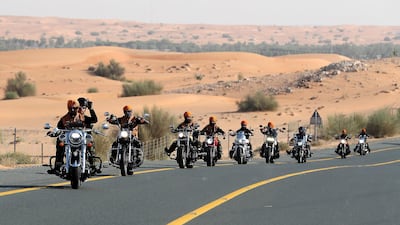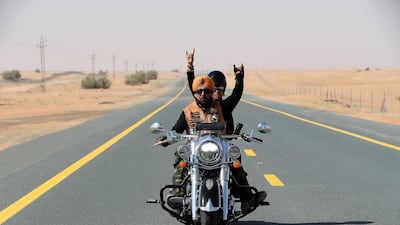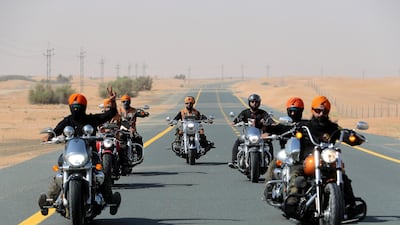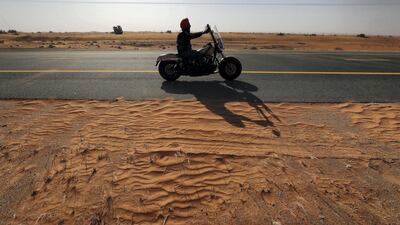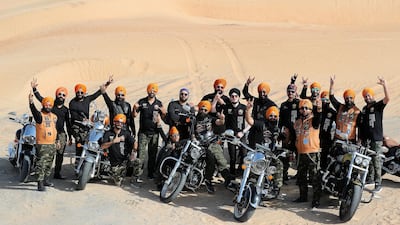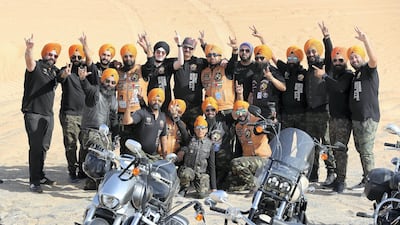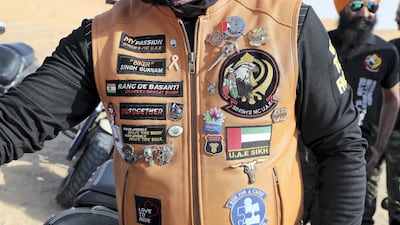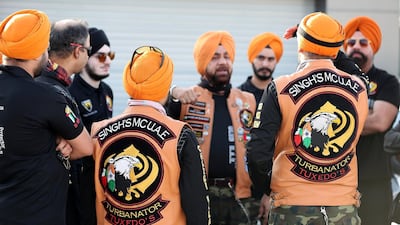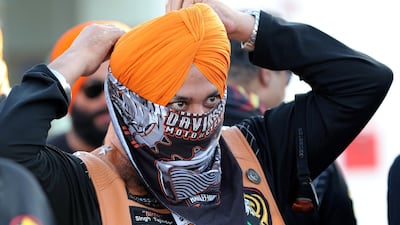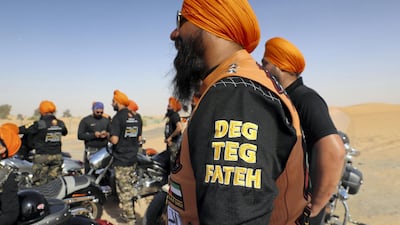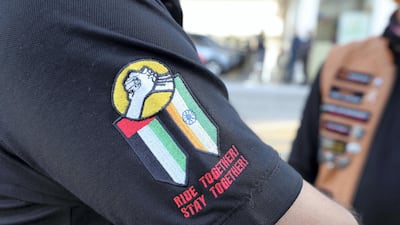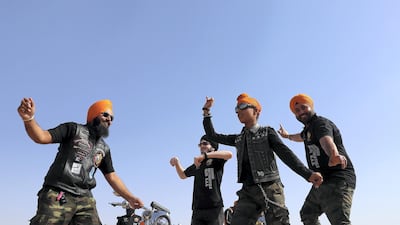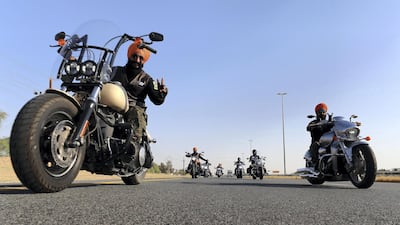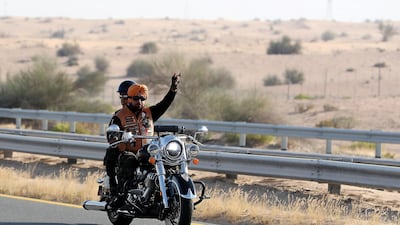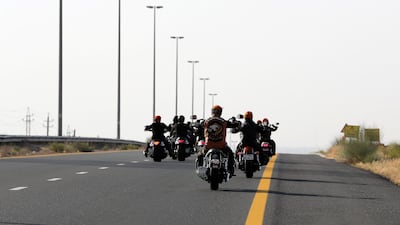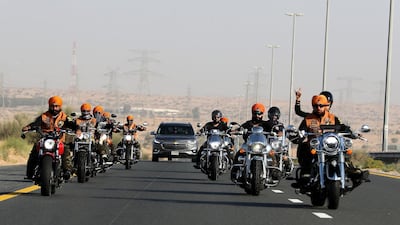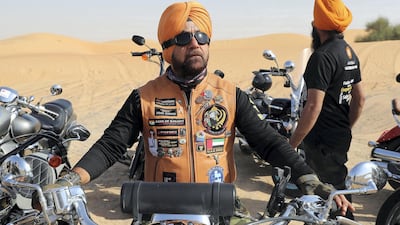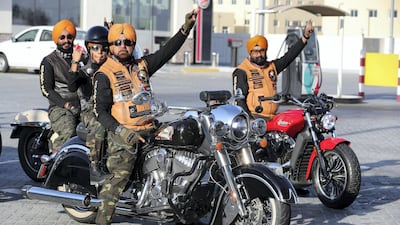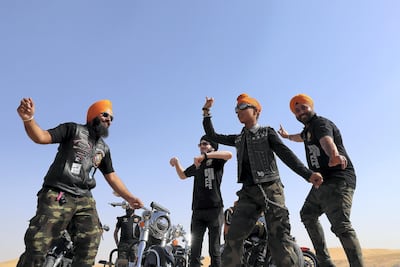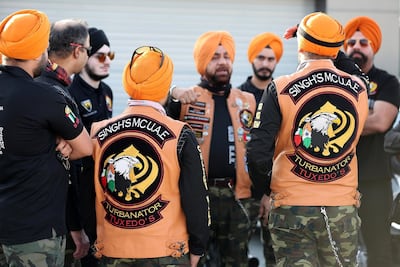The sun hasn't even started inching its way up into the sky and I'm already in the car, headed to the Enoc petrol station past Dragon Mart 2 in Dubai. The fluorescent light of the clock on the dashboard shines insultingly bright in the darkness: it reads 4.45am. To most people, this might sound unnatural. Being up at this hour is an event saved solely for unfortunate flight times. But I soon find I'm not the only one awake. As we reach our destination, I realise there are, in fact, dozens of other people who do the exact same thing every Friday morning.
Standing at the side of the car, sipping a coffee, I watch everybody mill about. The unassuming petrol station at the edge of the city is a hive of activity come 5.30am, with people split into groups of varying sizes. All of them with one thing in common: a love of motorbikes. It’s the thriving Dubai subculture many of us probably never knew about.
The Arabian Oryx Chapter is the first to arrive. About 20 to 30 men and women of various ages, wearing black, leather-clad clothes, congregate in a corner, high-fiving or hugging each other as one by one they ride in on their chosen steed. There are Harley Davidsons, Suzukis, Indian Motorcycles, Yamahas – you name it.
Then come the Raptors. There are only two of them that I see, both bravely (given the heat) sporting leather jackets emblazoned with the group’s name. They hang back, off to the side of the supermarket, presumably waiting for more riders to join them.
Meeting a group of speed-loving Sikhs
It’s Singh’s Motorcycle Club that I’m looking for, and they’re the last to arrive. I’m here to meet Gurnam Singh, a long-term Dubai resident and architect who founded the club five years ago. Thankfully, this group of speed-loving Sikhs is hard to miss, as almost every one of them is wearing a bright orange turban and jacket covered in badges and embroidered messages. In stark contrast to the slightly more rough-and-ready sayings I clock on the other groups’ gear, members of SMC sport motivational or religious sayings and slogans that emphasise the spirit of their faith.
On their arms, it says "Deg Teg Fateh", a Sikh slogan in Punjabi that signifies the responsibility of providing food and protection for the needy and oppressed. I spot the words "Chardi Kala", which means aiming to maintain a mental state of eternal optimism and joy. There are Year of Tolerance badges, breast cancer awareness ribbons and sayings like "four wheels move the body, two wheels move the soul" or "Ride together! Stay together!" written across their clothes.
I’m studying each of their outfits while, slowly but surely, 19 men and one child (Singh’s 10-year-old son, Mehardeep) trickle in. As someone new joins the group, it’s hugs, warm greetings and in-jokes all round. They’re a jovial, friendly bunch; a far cry from any image of burly bikers one might have conjured up.
By 6.30am, the group is assembled and we’re ready to hit the road – but not before a briefing. Singh steps up, commanding everyone’s attention. He’s what you’d call a “pillar of the community”; all of the members warmly greet him, call him “brother” and listen when he speaks. At one point, he even gets the two guys from the Raptors involved – Singh heads over to them, shakes their hands, has a quick chat and then calls for a group photo.
'It's not a matter of white skin, black skin... it's just brotherhood'
When we get the chance to speak, those first impressions are cemented. “Our message is about brotherhood and we want to connect with every community,” he says proudly. “It’s not a matter of white skin, black skin or whatever it is, it’s just brotherhood. We should all love each other; there should not be any hate.”
I, for one, certainly feel welcomed, despite my lack of badges and bike. Singh tells me I'm not the only female to have joined in – there's a championship motorcyclist from Ukraine who often rides with them. And participants don't have to be strictly Sikh, either. Ali Saeed, who's Muslim, is also a member, as is Vimal, who's Hindu.
"We are the same," says Vimal when I ask him why he chose to join a Sikh biking group as opposed to another Dubai motorcycling chapter. "We're from the same community, but you also get a lot of attention," he laughs, with a nod to the colourful headgear. "It's a serious stress-buster, too," he adds, as the shipping and logistics manager mounts his 1,300cc Yamaha. Vimal has been part of the group for four years, and he's not planning on leaving any time soon.
The Turbanators, as they refer to themselves, eventually drive into a line at the petrol station as they prepare to ride off together. They have designated positions, given to them by Singh during the briefing, but they already know the drill. They do this every Friday, and take a different route each week. Today we’re off down the Hatta-Oman Road, to find a decent location for our photo shoot. I ride along in the convoy of 4x4s and support vehicles.
About 40 minutes later, we find a suitable spot in the desert and park up. As the bikers roll in, we catch the attention of a Bedouin man passing by in his truck. He immediately jumps out and grabs his phone, posing for a photo with the group. They call him over and smile for the camera. Something tells me they’re used to this.
After our shoot, it's time to dance. "Sometimes when we ride and get to our location, we do some traditional Punjabi dancing," Singh explains. "Do you want to see?" Naturally. This time it's Singh's son who takes the lead, showing off his well-timed moves to a song called Pistol. A few of the guys join in, while others stay back and watch; everyone's laughing and smiling.
Helping in labour camps and connecting with youth
It’s not always this frivolous, however. Members all take the sport seriously, having gotten involved with some overseas rides, and they often drive for charities and good causes, too. They completed the Pink Ride Dubai to raise awareness of breast cancer, and donned bright pink T-shirts and turbans for the occasion. They’ve also worked on donation drives in the UAE’s labour camps. “That’s what motivates us,” says Singh, “doing something related to the community.”
He’s just chosen motorbikes as a way to do this. It’s a passion he attributes to his uncle, who also lived in the UAE and taught him how to ride. “I started biking at the same age my son is now. I used to sit in front, on the tank.” Sadly, his uncle died a couple of months ago, but Singh says he’ll continue to “carry the message forward”.
“In our community, the new generation is falling behind,” he says. “This is a very serious issue, as they’re not able to understand what Sikhism is. It’s very important for every individual to take this message forward the way our forefathers did, about how we came to be here and what Sikhism is all about. So if we carry it forward, they will carry it forward.”
Riding, he says, is a great way to spread that message. “It’s about action,” he adds. “Action is passion, it’s connection, and [the youth will] feel it’s not boring. They’ll say ‘let’s wear a turban like your dad, he looks like a celebrity’, and then they’ll feel the connection.” Although Singh is quick to point out that members don’t have to wear a turban, even if they are Sikh. Again, this goes back to his core message of peace and openness.
While religion clearly drives Singh, so does his love of the UAE, a country his family has called home since the 1970s. The group’s logo is a golden Khanda, the symbol of the Sikh faith, intertwined with a falcon and two feathers, each depicting two flags: that of India and the UAE. Singh is thankful they’re able to ride with their turbans on and freely practise their faith here. “They give a lot of respect to such things, as [Emiratis] also cover their head. They know the value of religion and culture [...] That’s why we’ve been here for the last 40 years.”
It was when Gurunanak Darbar Sikh Temple, the largest Sikh temple in the Gulf, opened in Dubai in 2012, that Singh was inspired to start his motorcycle club. “We are so grateful to the government of the UAE that they’re supporting us,” he says. “We find a lot of freedom in this country, which is not available elsewhere in the Middle East. It’s a big gift.”
Over food – a vegetarian English breakfast from Ikea’s cafe – a few of the riders tell me more about their faith. There are more than 50,000 Sikhs in the UAE, and the majority of them gather at the 100,000-square-foot gurdwara (temple). That’s where Singh has recruited many of the club’s now 50 members.
While they’re not trying to preach, their mission firmly includes teaching people about Sikhism. “There’s purity, a different kind of integrity and solidarity,” Singh explains, as others recount stories of Guru Nanak, the faith’s founder, and the 1897 battle of Saragarhi, when 21 Sikh soldiers stood against 10,000 Afghan tribesmen. The love and pride for their culture is almost tangible.
Before we go our separate ways, there’s just one more thing we have to do: Singh calls me over for a group photo.
I head home feeling tired, but also richer than I was a few hours earlier. Not only did I meet some genuinely lovely people, and learnt more about their beliefs, but I also discovered one of Dubai's hidden subcultures – one you'll only get to know if you're up early enough.
